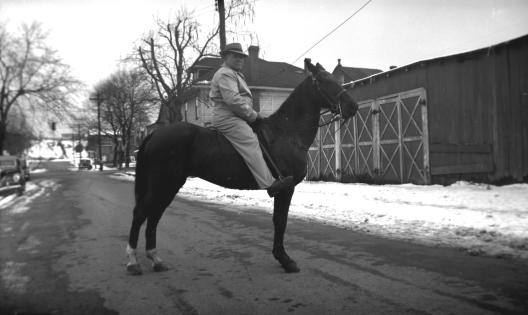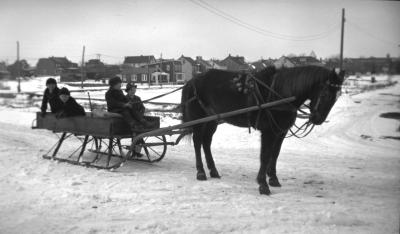Think About It: Your Life (and Science) is Greatly Shaped by Electric Refrigeration


My great-grandfather was an iceman. My family owned a local dam and sold ice by horse and cart to my hometown for decades. This process, which many people may have only been cursorily exposed to in the movie ‘Frozen’ or an episode of ‘The Three Stooges’, was critical to keeping food cold in ice chests and ice boxes before electric refrigeration was wide-spread.
Perhaps, one of the most astonishing facts about the ice business back in the early 20th century and prior, was that all ice was harvested in the winter! The ice was cut from a lake or pond and stored in huge barns and covered with straw to help insulate the ice throughout the summer. Imagine, today, if you walked into your home in mid-August and told your wife ‘Honey, I am unplugging the fridge until the winter!’ Well, if the icemen didn’t ration their ice stockpile strategically, it could very well be that the whole town could have to cut back on their ice use late in the summer until the cool weather took its grip on the area once again.

This takes us to today’s amazing realization – many scientific advances have allowed agriculture to prosper greatly such as mechanized tractors, the Haber-Bosch process, and genetic engineering, but perhaps one generally overlooked advancement was widespread, and reliable, refrigeration through the advent of the electric refrigerator increasing agricultural demand. No longer did families need to worry that opening the ice chest one too many times on a hot day would let their meat spoil or that late in the summer ice shortages could prevent them from storing their chesses or vegetables. Families could purchase and store food products long-term with a level of reliability at one time was only feasible in large industrial settings or in more northern climes. Temperatures were not only more consistent, but the storage conditions were guaranteed throughout the seasons permitting greater demands for food products from plants and animals now that the consumer, not only the producers and middle-men, could store foodstuffs on hand.
Fast forward to today and now I regularly use a variety of freezers at varying temperatures throughout my life and work. My apartment fridge runs at 2˚C and its freezer runs at -20˚C. In the lab we have three freezers set to 0˚C, -20˚C in another, and another all the way down to -80˚C (That’s -112˚F! Just 15˚F off from the coldest temperature ever recorded!). Such a temperature as -80˚C could never have been achieved without electric refrigeration and precise control of temperatures is often a non-negotiable for scientists as specific temperatures are absolutely critical to preserving chemicals, molecular samples such as DNA and RNA, and creating chilled environments required as steps in complex molecular biology procedures (such as extracting RNA or precipitating a compound from a chemical solution), not to mention storage of life saving items such as vaccines or organs in between transplants. It could be argued that without the deep and wide range of storage temperatures and accuracy provided by electric refrigeration, medical, biological, and agricultural advances and life would be very different than we are able to experience today.
Hopefully you have gained an appreciation for the seemingly mundane, but highly important invention and subsequent enhancement, that is electric refrigeration and why it is so important to our lives today, and science. So, seeing as how critically important it is that scientific plant samples, nucleic acids, and chemicals stay precisely at their required storage temperature or else they will degrade and become utterly unusable, I make the argument that the humble ‘Lab Freezer’ is in fact the most crucial component in a modern research lab setting.
PS - I have a special place in my heart for this argument, because our -20˚C died a couple months back.
Refrigeration is important!
Written by TPS fellow Cullen Dixon
